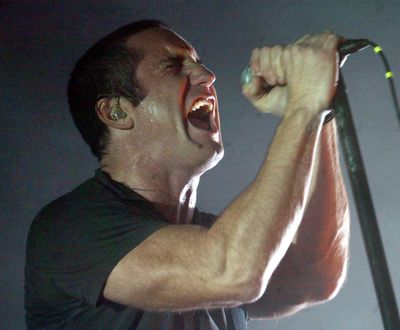Nine Inch Nails as sharp as ever
Band whose hard sound took ’90s by storm back on tour

Looking back at photos and video of Trent Reznor from the late ’80s and early ’90s, black hair shielding his eyes and his face contorted in young Gen X rage, it’s hard to believe that the healthy, clean-cut guy still playing arenas is the same Trent Reznor.
As the brain behind industrial rock giants Nine Inch Nails, Reznor brought a harrowing punk edge to electronic music, bridging the yawning gap between synth pop and hard rock. Reznor released NIN’s first album, 1989’s “Pretty Hate Machine,” when he was 24, and the record quickly became an underground hit.
By the time his second full-length, “The Downward Spiral,” came out in 1994, Reznor had become surprisingly commercial: Both “Pretty Hate Machine” and the ’92 EP “Broken” had gone platinum, and the song “Wish,” from “Broken,” won a Grammy for Best Metal Performance.
Do yourself a favor and revisit some of NIN’s early singles – “Head Like a Hole,” “Wish,” “Closer” and “Hurt”– because it’s apparent now more than ever why Reznor connected so strongly with the disillusioned teenagers who worshipped him. The songs still sound fresh: Reznor’s lyrics maintain a dark immediacy, and his haunting and unpredictable musical arrangements transcend the musical tropes of the era during which they were recorded.
Since his mid-’90s success, Reznor has gone through a lot, both personally and artistically. He kicked a drug and alcohol habit, he’s jumped around on various record labels, he’s released two albums with his side project How to Destroy Angels, and he’s gotten married and has two sons.
Oh, and he won an Oscar: Reznor and musical collaborator Atticus Ross took home Academy Awards for their score for David Fincher’s “The Social Network.” Who would have seen that one coming 20 years ago?
But the essence of Nine Inch Nails remains the same, and “Hesitation Marks,” the band’s first release since a self-imposed hiatus in 2009, picks up right where Reznor left off with 2008’s “The Slip.” Like that album, “Hesitation Marks” contains echoes of NIN’s earliest material, made all the more apparent when Reznor admits, “I am just a copy of a copy of a copy/Everything I say has come before.”
That statement neatly summarizes Nine Inch Nails’ career trajectory: Although Reznor has grown up, there’s a part of him that’s still that angry, paranoid, conflicted kid who sang about hurting himself to see if he could still feel. So what if he’s a copy of a copy of a copy? At least he’s honest about it.